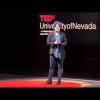Carol Dweck presents the important distinction between what she calls the "fixed mindset" and the "growth mindset" through examples in business, relationships, parenting and based on studies done with children, teens, and adults in and outside of the United States.
Those with a fixed mindset tend to believe that each of us has a fixed amount of intelligence and/or talent and that any challenge is, at best, a chance to confirm that we are as smart or talented as we hope we are, and at worst, a chance to show that we aren't really that smart or talented. It makes sense that this mindset / set of beliefs makes certain challenges seem highly risky and that those with this mindset would tend to avoid these challenges.
Meanwhile, often unbeknownst to those with a fixed mindset, those with a growth mindset believe that one can become more intelligent and/or talented and that one way to do this is through challenges. The stakes are much lower for those with a growth mindset, as a challenge is seen an opportunity for learning and, therefore, more easily embraced.
There are a number of important take-aways from Mindset. In addition to the important idea that people may be looking at themselves and at challenges through radically different lenses, one of the most important ideas is that effort is important, whether one sees oneself as intelligent and/or talented or not. If one already has a growth mindset, the idea that effort matters probably comes naturally. But, if one is starting off with more of a fixed mindset (there is really more of a continuum between fixed and growth mindsets, rather than two distinct categories), the idea that effort matters and that intelligence and talent / ability can be improved can be extremely important in building the motivation to work harder and to put in the necessary effort to improve.
- Log in to post comments



